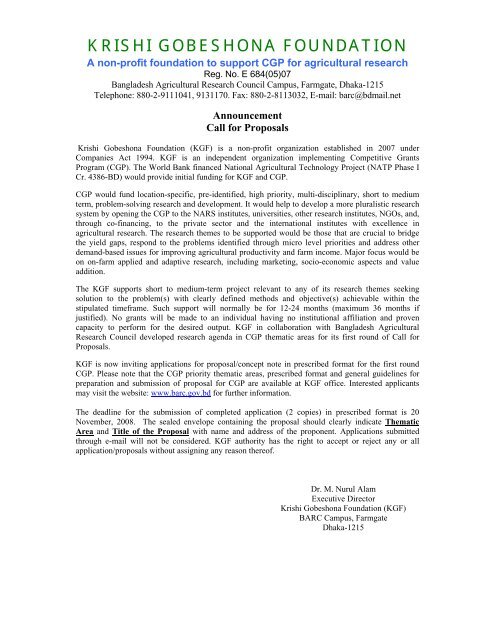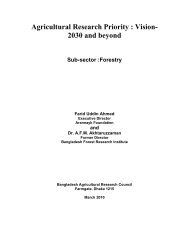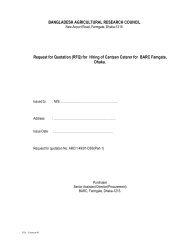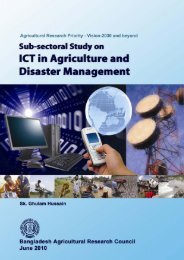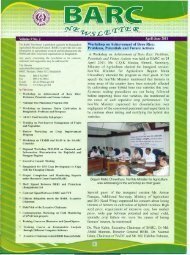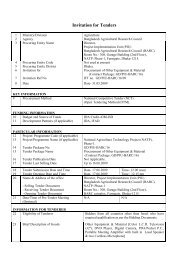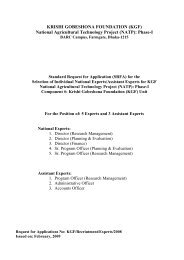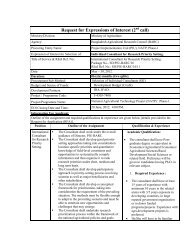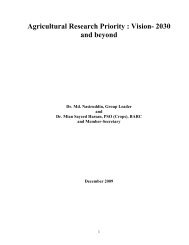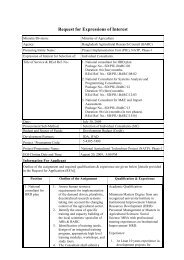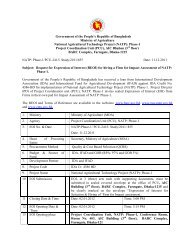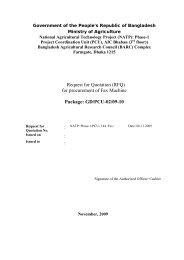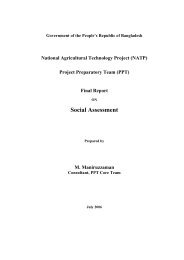krishi gobeshona foundation - Bangladesh Agricultural Research ...
krishi gobeshona foundation - Bangladesh Agricultural Research ...
krishi gobeshona foundation - Bangladesh Agricultural Research ...
You also want an ePaper? Increase the reach of your titles
YUMPU automatically turns print PDFs into web optimized ePapers that Google loves.
KRISHI GOBESHONA FOUNDATION<br />
A non-profit <strong>foundation</strong> to support CGP for agricultural research<br />
Reg. No. E 684(05)07<br />
<strong>Bangladesh</strong> <strong>Agricultural</strong> <strong>Research</strong> Council Campus, Farmgate, Dhaka-1215<br />
Telephone: 880-2-9111041, 9131170. Fax: 880-2-8113032, E-mail: barc@bdmail.net<br />
Announcement<br />
Call for Proposals<br />
Krishi Gobeshona Foundation (KGF) is a non-profit organization established in 2007 under<br />
Companies Act 1994. KGF is an independent organization implementing Competitive Grants<br />
Program (CGP). The World Bank financed National <strong>Agricultural</strong> Technology Project (NATP Phase I<br />
Cr. 4386-BD) would provide initial funding for KGF and CGP.<br />
CGP would fund location-specific, pre-identified, high priority, multi-disciplinary, short to medium<br />
term, problem-solving research and development. It would help to develop a more pluralistic research<br />
system by opening the CGP to the NARS institutes, universities, other research institutes, NGOs, and,<br />
through co-financing, to the private sector and the international institutes with excellence in<br />
agricultural research. The research themes to be supported would be those that are crucial to bridge<br />
the yield gaps, respond to the problems identified through micro level priorities and address other<br />
demand-based issues for improving agricultural productivity and farm income. Major focus would be<br />
on on-farm applied and adaptive research, including marketing, socio-economic aspects and value<br />
addition.<br />
The KGF supports short to medium-term project relevant to any of its research themes seeking<br />
solution to the problem(s) with clearly defined methods and objective(s) achievable within the<br />
stipulated timeframe. Such support will normally be for 12-24 months (maximum 36 months if<br />
justified). No grants will be made to an individual having no institutional affiliation and proven<br />
capacity to perform for the desired output. KGF in collaboration with <strong>Bangladesh</strong> <strong>Agricultural</strong><br />
<strong>Research</strong> Council developed research agenda in CGP thematic areas for its first round of Call for<br />
Proposals.<br />
KGF is now inviting applications for proposal/concept note in prescribed format for the first round<br />
CGP. Please note that the CGP priority thematic areas, prescribed format and general guidelines for<br />
preparation and submission of proposal for CGP are available at KGF office. Interested applicants<br />
may visit the website: www.barc.gov.bd for further information.<br />
The deadline for the submission of completed application (2 copies) in prescribed format is 20<br />
November, 2008. The sealed envelope containing the proposal should clearly indicate Thematic<br />
Area and Title of the Proposal with name and address of the proponent. Applications submitted<br />
through e-mail will not be considered. KGF authority has the right to accept or reject any or all<br />
application/proposals without assigning any reason thereof.<br />
Dr. M. Nurul Alam<br />
Executive Director<br />
Krishi Gobeshona Foundation (KGF)<br />
BARC Campus, Farmgate<br />
Dhaka-1215
Thematic Areas for SPGR and CGP under NATP<br />
PRIORITY RESEARCH AREAS FOR CGP<br />
Priority <strong>Research</strong> Areas of Crops Sector for CGP<br />
1. Varietal improvement and Genetic Resources<br />
a. Validation and upscaling of improved varieties/genotypes (in variable ecosystems)<br />
b. Collection of crop varieties<br />
c. On-farm conservation of genetic resources<br />
2. Farm productivity enhancement<br />
a. reducing yield gap in major crops<br />
b. crop diversification,<br />
c. resource use efficiency,<br />
d. ecosystems analysis<br />
e. development and validation of resource saving technology<br />
f. integrated farming for whole farm productivity and livelihood improvement<br />
3. Seeds and planting materials<br />
a. Seed quality improvement<br />
b. Farmers’ seed security<br />
4. Hill farming<br />
a. Ecosystem analysis<br />
b. Crop adaptation<br />
5. Coastal Agriculture<br />
a. Ecosystem analysis<br />
b. Crop adaptation<br />
6. Climate Change<br />
a. Assessment of vulnerability of crops to climate change<br />
b. Policy<br />
7. Soils<br />
a. <strong>Agricultural</strong> land loss and food security<br />
i. Assessment<br />
ii. Policy<br />
b. Nutrient use efficiency (NUE)<br />
i. Management options and NUE<br />
ii. Techniques of improving NUE<br />
c. Water use efficiency<br />
d. Problem soils<br />
e. Land productivity<br />
f. Soil organic matter<br />
8. Small-scale farm machinery<br />
a. Adaptation and upscaling<br />
9. Post-harvest technology<br />
a. Processing and product development<br />
b. Agro by-products
10. High value agriculture<br />
a. Validation and upscaling of improved varieties/genotypes of high value specialty<br />
crops<br />
b. Demand and supply potentials<br />
c. Organic production; prospects and market demand<br />
11. ICT in Agriculture<br />
a. <strong>Agricultural</strong> Databases and Knowledge Banks<br />
b. Use of Geographic Information System and Remote Sensing<br />
Priority <strong>Research</strong> Areas of Livestock Sector for CGP<br />
1. Health Management and Clinical <strong>Research</strong><br />
a. Herd Health Management<br />
2. Diagnosis & Diagnostics<br />
a. Validation and up-scaling of diagnostics, therapeutics, vaccines & biologics<br />
3. Feeds & Fodder<br />
a. Feeding Information and Feeding Standard<br />
4. Livestock Marketing<br />
a. Value chain Development<br />
Priority <strong>Research</strong> Areas of Fisheries Sector for CGP<br />
Benefits of Small and Marginal Farmers<br />
a. Socio-economics of fishermen & fisher folks<br />
b. Fisheries database development<br />
c. Impact of climatic change on fisheries<br />
Priority <strong>Research</strong> Areas of Socio-Economics, Marketing, and Supply and<br />
Value Chain for CGP<br />
Socio-Economics/Productivity and Profitability<br />
1. Assessment of improved technologies for poverty reduction and food security<br />
2. Evaluation of economic benefits of different crops and non-crop enterprises<br />
3. Benefit cost of technologies for yield gap minimization<br />
4. Impact assessment of different technologies/projects<br />
5. <strong>Agricultural</strong> price policy<br />
6. Impact of agricultural credit and micro-finance<br />
Marketing and Supply Chain<br />
1. Agri-business and agro-processing of agricultural products<br />
2. Development of effective supply and value chain<br />
3. Promotion of agricultural marketing in hill and other areas<br />
4. Export market potential of high value crops<br />
5. Demand-supply estimation of different food items<br />
Post-Harvest<br />
1. Post-harvest processing of high value crops<br />
2. Management of pre- and post-harvest losses<br />
3. Processing technologies for development of agro-based products
General Guideline on submitting an Application for CGP<br />
Krishi Gobeshona Foundation (KGF) is a not-for-profit, independent organization making<br />
grants to researchers working in public sector universities, government (GO), nongovernment<br />
(NGO), and private organizations (PO) engaged in agricultural research and<br />
development. Competitive Grant Program (CGP) of KGF is to encourage and promote<br />
research that has potential to contribute to generate, validate, upscaling and adoption of<br />
technologies in order for increasing production and enhancing food security. KGF in<br />
collaboration with <strong>Bangladesh</strong> <strong>Agricultural</strong> <strong>Research</strong> Council developed research agenda in<br />
thematic areas for its first round of Call for Proposals. KGF supports activities that generate<br />
and transfer knowledge addressing food security issues while sustaining environment.<br />
Purpose of grants:<br />
The essential purpose of the grant is to support a single project on a clear set of problems - a<br />
piece of work designed to answer a single question or a small group of related questions. The<br />
KGF supports short-term project relevant to any of its research themes seeking solution to the<br />
problem(s) with clearly defined methods and objective(s) achievable within the stipulated<br />
timeframe. Such support will be normally for 12-24 months. No grants will be made to an<br />
individual. It is expected that the grant applicant or the main proponent will be the Principal<br />
Investigator (PI) of the project, and, if the applicant is successful, will be the grant holder,<br />
responsible for directing and being actively engaged in the project.<br />
Procedure for proposal submission:<br />
KGF follows a two-stage process of proposal submission. All eligible proponents (see<br />
eligibility criteria below) interested to submit a proposal to the KGF must submit a Preproposal<br />
Concept Note following the guidelines and format specified in this guideline.<br />
Proposals received at the KGF secretariat will be screened at the Secretariat and those<br />
fulfilling the criteria will be forwarded to selected reviewers. A panel of experts will evaluate<br />
the proposal.<br />
General notes:<br />
The proponents of successful proposals will be called for making presentation before the<br />
panel. Based on the merit of the project, resources available to and capability of the<br />
proponent, and outcome of the presentation, short listing of proposals will be made.<br />
Successful proponents will proceed to second stage and will be invited to submit a Full<br />
Proposal for further consideration for KGF funding. The full proposal must follow the<br />
guideline and format specified; and must be received by the KGF secretariat within stipulated<br />
time given by the KGF. Full proposals from successful stage I proponents submitted after the<br />
deadline will not be considered.<br />
Funding:<br />
KGF will provide limited financial support for applied and adaptive research activities that<br />
fall within its areas of interest. Normally a short-term project accomplished in 12-24 months<br />
may be funded. The average grant for a project may not exceed Tk. 2,000,000. Under<br />
exceptional circumstances a limited number of multi-year project (maximum duration – 36<br />
months) may be funded. All proposals must provide a clear budget estimate breakdown of the<br />
year-by-year funding requirements.
Criteria for Evaluation:<br />
• Technical soundness & capacity to produce the output as planned.<br />
• Consideration of funding support (Cost sharing by the proponent : Private<br />
Organization and International Centres);<br />
• Adequate administrative and salary support;<br />
• Cost effectiveness;<br />
• Meeting standard of experimental/study design, and data collection;<br />
• Extent and quality of inter-institutional linkage;<br />
• Clear delineation of technology transfer and uptake pathway.<br />
Eligibility for remuneration:<br />
Grants may be used for remuneration for either whole-time or part-time research workers. It<br />
is expected that the PI and the co-investigator(s) will be in fully salaried position(s); however,<br />
they will be entitled to receive a modest honorarium as provided hereunder:<br />
1. Principal Investigator (PI): Tk. 15, 000-30,000 per month (consolidated remuneration)<br />
depending on relevant experience (to be decided by KGF) and qualification as follows:<br />
• A person having a PhD and research/R&D experience of 20 yrs Tk. - 30,000 (Max.)<br />
• A person having a PhD/MS and research/R&D experience of 15 yrs Tk.- 25,000<br />
(Max.)<br />
• A person having an MS and relevant research/R&D experience of 10 yrs Tk.- 20,000<br />
(Max.)<br />
2. Co-Investigator: remuneration Tk. 10,000-15,000 per month depending on research<br />
experience & qualification: (to be decided by the KGF).<br />
3. <strong>Research</strong> fellow/research assistant Tk. 10,000-15,000 (per month) including PhD/MS<br />
students having not a recipient of scholarship from other sources.<br />
Eligibility of <strong>Research</strong> Cost:<br />
KGF will fund research operating cost and consumable expenses and the purchase of modest<br />
essential equipment associated solely with the research grant application, as detailed in the<br />
project proposal format and approved by the KGF authority.<br />
Applications received within the deadline will be submitted to an external referee before<br />
being considered for short-listing of the proposals for presentation before a committee of<br />
experts. The final decisions will be made by the KGF Board of Directors based on the merit<br />
of the project proposal and presentation made before the committee of experts.<br />
KGF authority has the right to accept or reject any or all applications/proposals without<br />
assigning any reason thereof. The supplied format must be used by the proponent. KGF may<br />
improve/modify any items of the proposal format/guidelines/conditions in order to better<br />
achieve objectives of CGP research.


